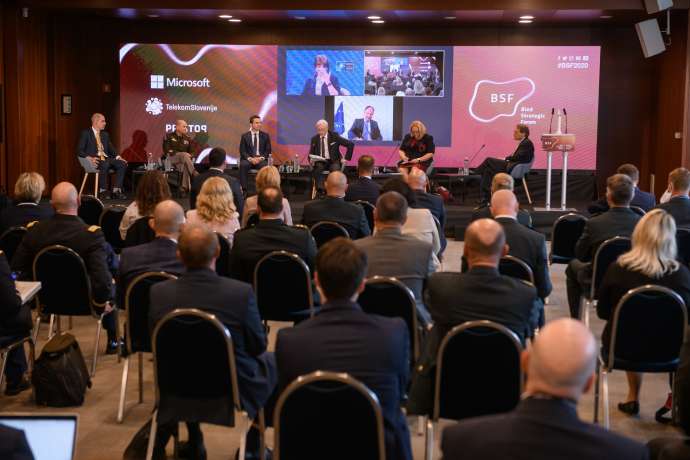STA, 31 August 2020 - The 15th Bled Strategic Forum (BSF) boasted the most high-profile turnout in its 15-year history despite the coronavirus pandemic. Two presidents, seven prime ministers, six foreign ministers and many others attended in person, plus a number of high-profile panellists remotely. The debates focused on the future of the EU and the region's role.
The main panel featured seven Central and East European leaders, who highlighted the region's growing influence in the EU. They stressed the importance of true solidarity between all member states, noting that double standards were being used for the region.
Slovenian Prime Minister Janez Janša said it was "dangerous to use double standards". He said the real challenges that Europe faces are different than challenges that are being discussed, a reference to extensive debates about rule of law proceedings against Hungary and Poland.
Polish Prime Minister Mateusz Morawiecki noted that thirty years after the democratic transformation began in the region, there was still "a very peculiar approach" to the region. He said the region needed to maintain solidarity and unity, and at the same time be part of the European Union.
As for the state of the rule of law and democracy, Morawiecki rejected the notion of polarisation arguing that this was normal democracy. "We're not nationalists, populists ... it's simply a different approach in the post-communist world."
Similarly, Hungarian Prime Minister Viktor Orban, asked about the state of democracy in his country, said Hungary's democracy was just as good as Germany's or Italy's by objective measures, the country just has a conservative, Christian democratic approach as it strives for "intellectual sovereignty".
The need for close cooperation, communication and the relaxing of restrictive EU state aid rules in the face of the global pandemic were in the centre of a panel debate featuring top foreign policy representatives. The broadly shared view was that the EU provided valuable support, still, the key, initial, response to the pandemic was mounted by member states.
Slovak Foreign Minister Ivan Korčok said that the EU "absolutely" provided help in addition to what was already being done by his country at home. He illustrated that while the EU was not able to provide masks when the pandemic hit, it is now leading member states out of the crisis with the recovery fund.
Czech Foreign Minister Tomaš Petriček highlighted another aspect of the crisis, saying it showed how fast the EU could revert to nation states. He illustrated that people did not complain much when the Czech Republic closed its borders at the start of the crisis.
However, when asked whether nation states or the EU would emerge stronger from this crisis, panellists expressed reservations about putting these in antagonistic terms.
Polish Foreign Minister Zbignew Rau labelled this an artificial conflict, adding that only strong member states made for a strong EU, while Croatian Foreign Minister Gordan Grlić Radman said member states and the EU need each other.
The Western Balkans was another major topic of discussion despite the absence of the traditional regional panel with foreign ministers.
Serbian President Aleksandar Vučić, participating in the leaders' panel, thus dismissed the notion that Serbia was not keen on joining the EU. He said Serbia remained committed to the European path but expected respect from the EU.
Miroslav Lajčak, the EU's special representative for Belgrade-Prishtina dialogue, said in a special panel that the Western Balkans are part of the European story and the region's problems are also the bloc's problems. "If the EU wants to be a global actor ..., then we have to start demonstrating that we can help organise things in a European way on European soil."
There were also debates on European security and asymmetric threats, digitalisation and the future of cyberspace featuring mostly experts.
The security panel for example heard that a lot of adjustments to the European defence and security policy will be needed, including because of cyber threats and the Covid-19 pandemic. China was also discussed as an element which seeks to direct countries in the region more towards the east.
Slovenian Foreign Minister Anže Logar said the forum provided an introduction to the coming debates on the future of the EU, which will be conducted under the German, Portuguese, Slovenian and French presidencies of the EU as part of the conference on the future of the EU.
According to Logar, these debates showed that "the leaders of individual countries see the EU and the consequences in which we are differently", which he said was "an excellent starting point for an open and lively debate".
Moreover, Logar said Slovenia was "returning to the diplomatic map" after a period of pursuing a distinct foreign policy. He rejected the notion that Slovenia was leaning more to the East now, arguing that "one country is not more important than another ... a community of equal countries provides a good platform for all countries to assert their interests."






